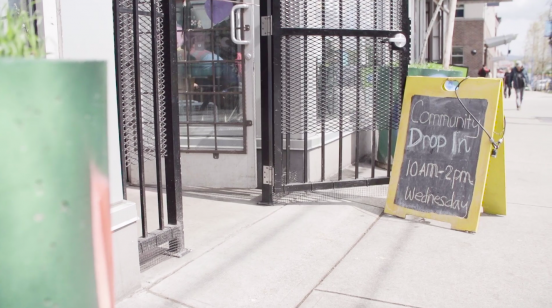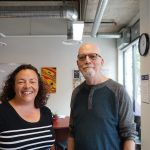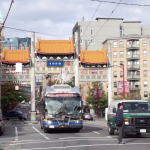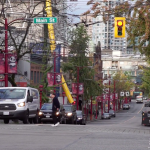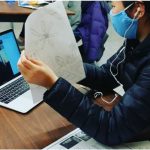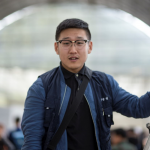Part 2 of 4. From App to Oppenheimer
By Robyn Taylor-Neu
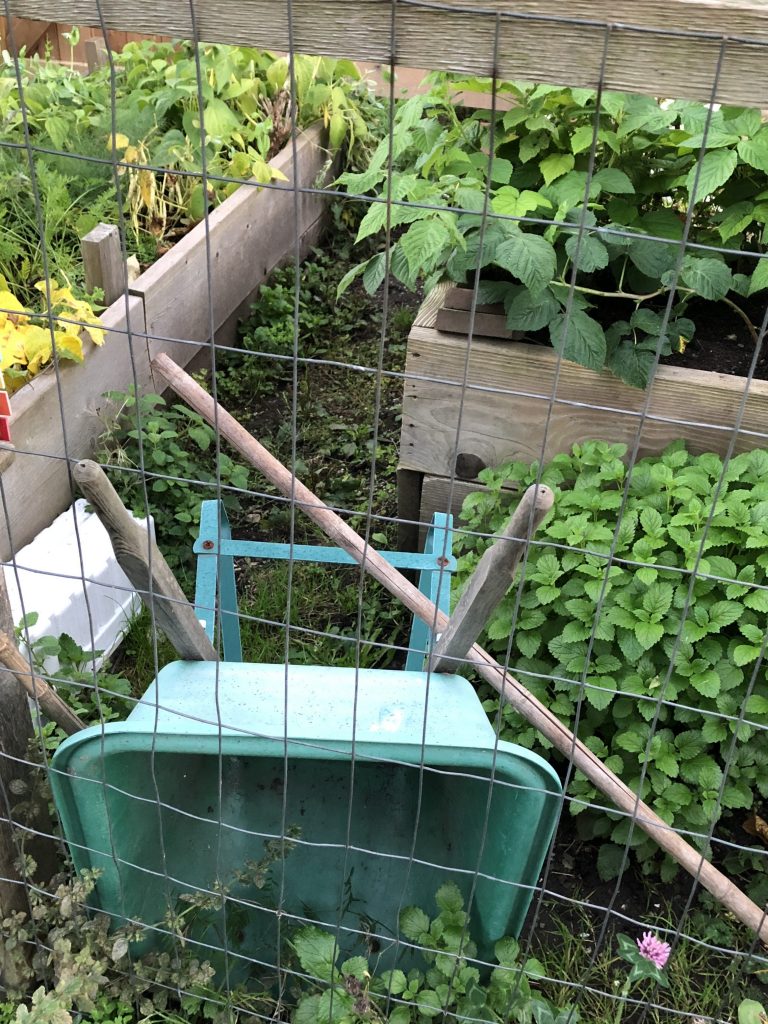
Coming up along Jackson from East Hastings, you’ll enter Oppenheimer Park from the southeast corner, pass clusters of people, sitting, standing, and milling around, before reaching the egg-shaped, glass and aluminum field house. When I arrived, the first time I visited the Tech Café, I found myself immediately hailed: “Hey, can I get you a coffee?” Just in front of the building stood a folding table laden with trays of muffins and cambros
of coffee.
“No, thank you,” I declined, smiling at the man—perhaps a volunteer, perhaps a DTES community member, or perhaps both—as I passed into the field house, into the Oppenheimer Park Tech Café.
Upon reflection, several things about this scene stand out. Most striking, is the impression of entering a social world, a community. People here seem to know each other. They nod and exchange greetings, pause to chat… I’ve been told that Oppenheimer represents something special in the Downtown Eastside (DTES) neighbourhood; once here, I begin to see why. I also begin to see why, when choosing a site for the initial Tech Café, William and Dionne picked the park.
“There were a lot of folks…that didn’t have any tech skills but were not interested in going into a particular community organization,” Dionne clarifies, “…maybe they weren’t allowed in Carnegie anymore and they didn’t want to come to the learning exchange because it’s the university.” Many community members, we learn, have had negative experiences that have left them wary of educational institutions in general. “Some of our folks dropped out of school in grade five because, you know, either they were going to residential schools and they ran away, or they had a teacher who kept telling them they were dumb and stupid,” Dionne recounts.
In short, a combination of barriers prevented many DTES community members from accessing technology training—and without this tech know-how, they couldn’t benefit from the LinkVan app’s resource directory. When William and Dionne came up with the idea for the Tech Café, it seemed to solve two problems in a single stroke. Dionne explains: “We thought that we could marry the[m] together: introducing the app to the community via Tech Café.” The idea, William says, was to “bring education to the community.”
To address the community’s need for informal tech help, though, William and Dionne first needed to find funding. They applied for a grant and with support from UBC’s Learning Exchange, the DTES roundtable, and the Carnegie Center, began setting up the initial Tech Café in Oppenheimer Park. As William and Dionne describe this process, I slowly realise that both initiatives revolve around the idea of conversation. But what does this “conversation” constitute? Let’s take a moment to tease out some of its attributes, to try to get at the grounds of the Tech Café’s success.
For starters, conversations are defined by turn-taking. If there’s no back-and-forth, no exchange of remarks, it can’t be called a conversation. Further, this turn-taking is also a give-and-take: the interaction is more or less reciprocal. Your employer’s sermon on the value of punctuality, for instance, doesn’t constitute a conversation, even if punctuated by your defensive or submissive replies. In addition, conversations have duration—a conversation takes place over a period of time, and so an exchanged comment or two hardly counts as a conversation (except, perhaps, when described sarcastically). Finally, conversations are non-linear, flexible and, to some degree, improvised. A scripted dramatic interchange may be a dialogue but it’s not a conversation.
All of these attributes of conversation—turn-taking, reciprocity, duration, flexibility—characterize the LinkVab app development process as well as the Tech Café initiative. As Dionne explains, “It’s a constant conversation back and forth with the
agencies and with the community who are coming to the Tech Cafés to see—is it working? What can we do differently?” It also becomes apparent that conversations are not just about the exchange of information. They’re also about relationships:
“Conversations are important because people at organizations, they’ll come and go. So you need to kind of build that relationship [and make it] ongoing.”
Ongoing relationships grow out of ongoing conversations—and, accordingly, William and Dionne’s commitment to ongoing conversation is a commitment to relationships going forward. This commitment, it becomes increasingly clear, is essential to the success of the LinkVan and Tech Café initiatives. A second, critical component is the commitment to “meet people where they’re at.” In the course of our interview, the phrase kept coming up: the app was about “meeting people where they’re at,” the Oppenheimer Tech Café pilot was motivated by a desire to “meet people where they’re at,” the expansion of the Tech Café into other community organizations and venues is another means of “meeting people where they’re at.”
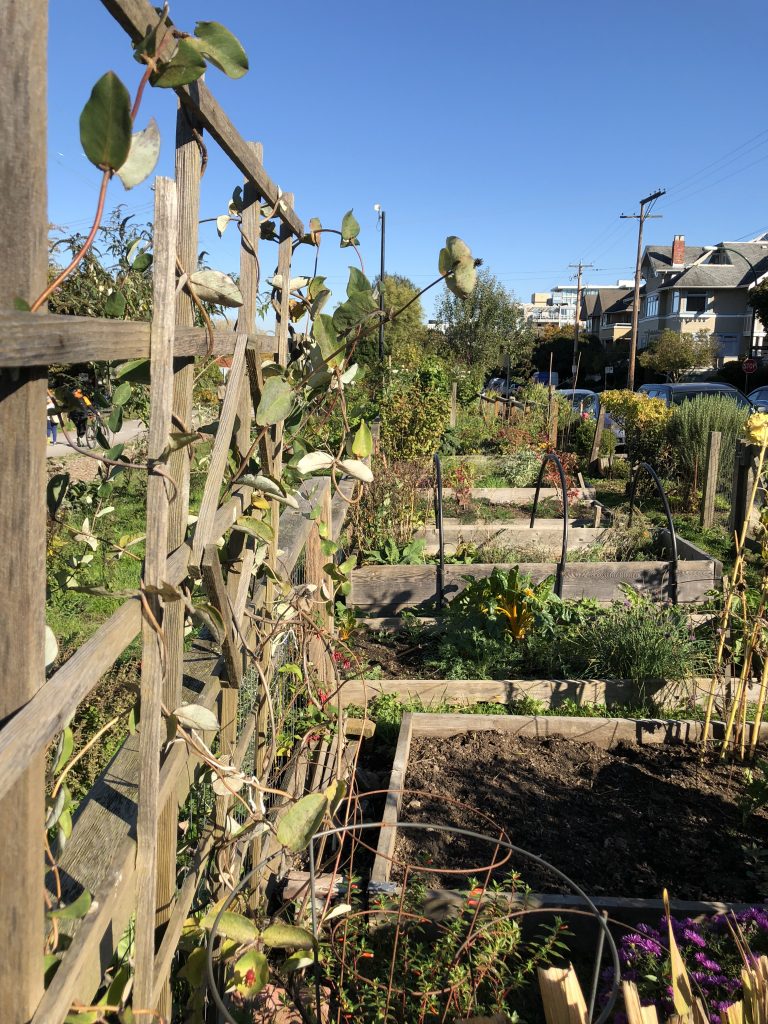
For William and Dionne, recruiting community members to be “peer educators” and “community ambassadors” was key: in the case of LinkVan, these educator-ambassadors took the app out into community spaces like shelters, community centers, and parks (like Oppenheimer), to quite literally “meet people where they’re at.” In the case of the Cafés, the educator-ambassadors “meet people where they’re at” in a more figurative sense—since there’s no fixed or formal rubric for the Cafés, people can participate to the extent that they’re comfortable with. In fact, William remarks, “Some of the people that you’ve met…are people who originally came to the Tech Café and were not necessarily engaged. They were watching what was going on at first…” “Meeting people where they’re at,” then, means taking cues from the community. It means letting community members set the pace. And above all, not to harp on an earlier theme, it means being attentive.
******
